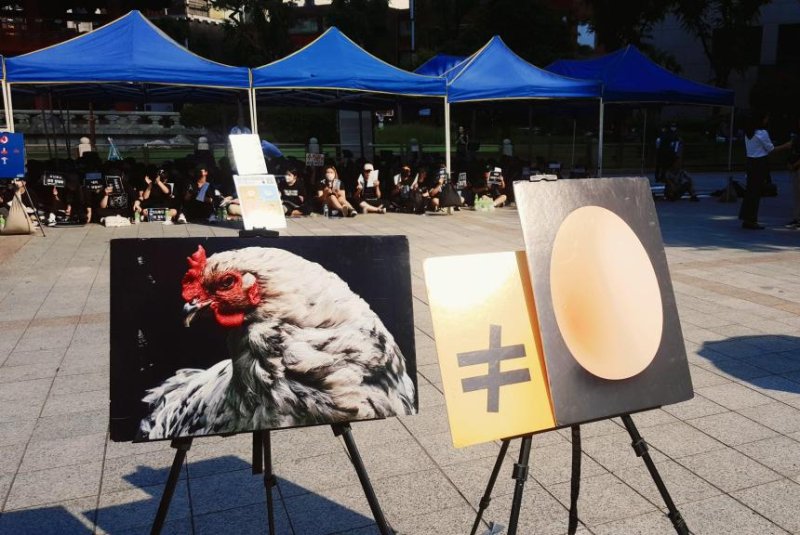1 of 2 | Members of a pro-choice civic body rally in central Seoul on June 3 to demand the decriminalization of abortion. File Photo by Yonhap
SEOUL, Aug. 30 (UPI) -- Women's rights groups and doctors have expressed fury over the government's decision to classify surgical abortions as "unethical," fueling debate on women's reproductive freedom in a conservative country with one of the world's lowest fertility rates.
Seoul's Ministry of Health and Welfare announced Aug. 17 a revised Medical Act, which lists surgical abortions as an unethical medical practice, along with sexual abuse, using unauthorized medicine, reusing single-use devices and ghost surgery (in which one doctor substitutes for another, without the patient's knowledge), among others.
Doctors would be suspended for one month in violation of the revised law as it takes effect this month.
Obstetricians have condemned the revisions, saying it portrays them as potential "criminals." Many are refusing to conduct any surgical abortion unless the ministry withdraws the new law.
"We refuse to be punished under the revised law, which fails to recognize the reality, in which surgical abortions are unavoidably carried out for so many reasons," a group of obstetricians and gynecologists said in a statement Tuesday.
In response to the immediate backlash, the health ministry decided Thursday to postpone implementing the one-month suspension.
A Seoul-based women's rights group, BWAVE, has criticized the government and doctors.
"The government has made it more difficult for women to have an abortion to raise the nation's fertility rate," the group said. "Doctors have taken women's health and life as a hostage for their own benefits."
The group staged a protest in Seoul on Saturday, calling for the termination of the current anti-abortion law and demanding women's reproductive freedom.
Doctors and women's rights groups have pointed out that the government's move to toughen punishment for abortion would limit women's access to safe abortion services.
"This could encourage unsafe, illegal surgical abortions underground," Lee Chung-hoon, head of the Korean Association of Obstetricians and Gynecologists told UPI.
Lee said the current law is too outdated to recognize circumstances women face in choosing abortion and therefore fails to respect women's reproductive autonomy.
"The law allows abortion in very limited cases that only cover a very slim percentage of surgical abortions being carried out today," Lee said.
South Korea allows selective abortion only in cases such as those involving rape and incest and fetal abnormalities.
"It's too selective to recognize various cases that need surgical abortions. If a fetus has a genetic disorder, the current law doesn't allow surgical abortions, but only for cases where parents hold the same genetic disorder," Lee said.
South Korea's fertility rate dropped to a record low of 1.05 last year, with a total of 357,800 babies
born, a 12 percent drop from 2016. The total fertility rate in the second quarter of this year was 0.97, according to Statistics Korea.
In April, a Seoul-based think tank on women's issues conducted an online survey of women who had abortions or considered having one.
More than 30 percent said they decided to have an abortion as they were not financially ready to raise a child and 20 percent said they needed to continue study or work. Some 12 percent of respondents said they didn't want to marry because of pregnancy.
The survey, conducted by the Korean Women's Development Institute, also found that 77 percent of women supported legalizing abortion while 23 percent were against it.
Another survey by the health ministry and the graduate school of public health at Yonsei University in 2010 found that 77 percent of women surveyed decided to have an abortion because of unwanted pregnancy and concerns of being single and pregnant. Those who had an abortion due to fetal abnormalities consisted of 20 percent.
The ministry's latest survey to date found there were more than 168,000 cases of surgical abortions in 2010, down from some 350,000 cases in 2005.
The debate between pro-choice and anti-abortion advocates has been ongoing since the Constitutional Court sided with abortion restrictions in its 2012 ruling.
The court is expected to rule on the law once again later in the year in a case filed by a doctor who was criminally charged for carrying out abortions upon patients' requests.
Earlier this month, a group of some 400 women's rights activists and scholars submitted a petition to scrap the law.
"Keeping the anti-abortion law threatens women's health and life and breaches women's reproductive freedom," the group said in its statement.















